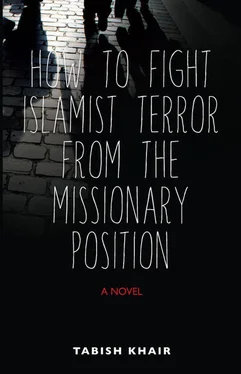I knew he could not take Ajsa to his room: his understanding of his religion prohibited him from being alone in a room with her, and for all I knew, she shared those values too. She was a young woman who had discovered Islam as a reaction to both her parents and the place that history had confined her to: a place where her Nordic looks would probably efface her more easily than if she had been dark-haired and dark-eyed. But it was also obvious that they wanted to talk about matters without Ravi or me overhearing.
Until the events that put things in perspective, whenever Ajsa came to call on Karim Bhai, I sensed the same hesitation and secrecy. I mentioned this to the police officer later on. He smiled grimly and nodded.
GREAT CLAUS AND LITTLE CLAUS
There is a poem by Henrik Nordbrandt, the only Danish poet Ravi, whose conversations were otherwise peppered with quotations from Hindi, English, French, German and, especially, carefully enunciated Urdu poems, ever quoted in my hearing. It lists the months of the Danish year as being thirteen: “januar, februar, marts, april, maj, juni, juli, august, september, oktober, november, november, november.”
November had lasted, with a short break in February, well into March now, extending the Danish year by another two dark, blowsy, wet, cold months. Though the snow had melted, once in a while the air still filled with white flakes, making me feel as if I was trapped inside one of those paperweights that, in the heat of Karachi, had once looked so tempting. You know, the ones with white fluff swimming in the water: you shake them and it snows all over the plastic Alps or some pretty European cut-out village inside the glass.
Perhaps it was the weather that kept us indoors more often than not during the daytime. In Ravi’s case, it might also have been the PhD thesis or, what was more likely, the novel that he was working on. He preferred writing at home. I would go out more often, as I had to teach and attend the usual interminable departmental meetings, where we pretended to be democratic even as all significant decisions were increasingly made way above us. But on days when there was no teaching, I would loiter in the flat too, reading, instead of following my usual routine and going to the library. Very soon, we learned to place the other residents of the building.
Divided by a winding central staircase, with frail-looking wooden railings, the building rose to five stories. It was a pre-war construction. On both sides of the staircase, past the narrow-latticed landing, there were two-bedroom flats exactly like Karim Bhai’s. Most of them were occupied by young couples intending to have a baby and then move out. One couple had a baby of six months. They spent their weekends looking at houses in the suburbs. Ravi was curious about what they would do with their weekends once they actually bought their suburban house. A couple of the flats were rented by university students: two men in one and three women in the other. Only the top two flats contained anyone even as old as Karim Bhai.
The top two flats had been converted into one spacious flat by the family that lived there and, according to Karim, had lived there for almost two decades. The father, Claus, was a doctor, and the mother, Pernille, was a secretary at the university. Both were in their early fifties. Their twin daughters had moved out just a year ago when they started attending university.
Though Karim Bhai knew everyone who lived in the flats by name—we later realized that many of them booked his taxi in the black—he visited and was visited by only Claus and Pernille. This might have been due to their age. Karim Bhai found it easier to talk to people who were a decade older than him than to people who were a decade younger. But there were other factors too.
Pernille and particularly Claus took a sort of fraternal interest in Karim Bhai and, by extension, us. Claus had seen us moving our furniture and cartons up on the very first day and had offered to help. When we had declined, he had dropped in the next evening with Pernille and greeted us with a resonant salaam-alai-kum. He had followed this up with a heavily accented “sob kuch teek-taak, na?,” his small grey eyes twinkling impishly. It turned out that he had spent a number of months in Pakistan, working for various NGOs, mostly “Læger Uden Grænser,” Doctors Without Borders. Claus was a large, bearded man beside whom the shrunken, skinny Pernille looked even smaller.
It soon became clear to us that Claus was used to dropping in for a chat every third day or so. With Karim Bhai, and now us, he assumed a persona that was consciously pruned of Danish constraint. Pernille was a more rare and reserved visitor. Usually Claus would drop in with his friend, also a doctor, whose name was Hans. Hans was a slightly smaller version of Claus, and Ravi soon dubbed him Little Claus. Bearded, broad and only a couple of inches under Great Claus’s six feet, the friends could have passed for lumberjacks. Or surgeons, Ravi corrected me. Surgeons look like lumberjacks, he added.
Little Claus had also spent time in Pakistan. Actually, it turned out that, from the time the two met in the third year of their medical studies at Copenhagen, Great and Little Claus had gone on regular NGO trips to various parts of Asia and Africa, taking some months off every couple of years or so. It is our idea of a vacation, they had explained modestly. Pernille, whose interest in the world was less pronounced and whose career was tied to daily working hours, had mostly stayed home with the kids on these occasions. Perhaps she had resented it but realized too late; perhaps, like other people of her generation and class, she would have liked living in a suburban house instead of a double-flat that fitted Claus’s peripatetic lifestyle. But these doubts came to me only much later.
There was a soft knock. It was a Thursday afternoon. I was in my room; Ravi was banging away at his laptop in the kitchen; Karim was out on one of his shifts.
One of the two Clauses, I said to Ravi. They were the only people who knocked instead of ringing the bell.
“Great Claus, Elementary Watson,” Ravi commented. “Great Claus has a little knock; Little Claus has a great knock.” Both the Clauses were there, with a cake.
“Sob kuch teek-taak, na?” said Great Claus. It had become his standard greeting with us. Having realized that Ravi was a Hindu and I was a ham-eating, wine-drinking Muslim, he had reserved his resonant “salaam-alai-kum” for Karim.
“Where is Karim?” he said now. “We have a cake for him, made personally by moi with strictly halal ingredients.”
“It is Claus’s birthday,” Little Claus explained.
They were disappointed when they heard that Karim was out. Then Great Claus cheered up. Wait a sec, he said and ran upstairs. He was back in a minute with a bottle of champagne and four glasses.
“We can keep the cake for Karim and celebrate with something less Islamic,” he announced, pouring the bubbly into glasses in the kitchen.
“Shouldn’t you be celebrating with your family?” I said.
“I will; I will; I am a bleddy good familiefar,” replied Great Claus with just a hint of bitterness.
We toasted him.
“Skål!” said Little Claus, lastly, “to our twentieth, Claus, min ven!”
Great Claus looked visibly touched. There were tears in his eyes. Perhaps that’s why he needed to explain the toast to us.
“You see,” he said, “this is the twentieth birthday that I have celebrated with Hans here or in Pakistan or in Kenya…”
Little Claus looked pensive.
“I have celebrated more birthdays with you, min ven, than I have with anyone else,” added Great Claus, laying his slightly bigger hand on Little Claus’s paw.
Читать дальше












